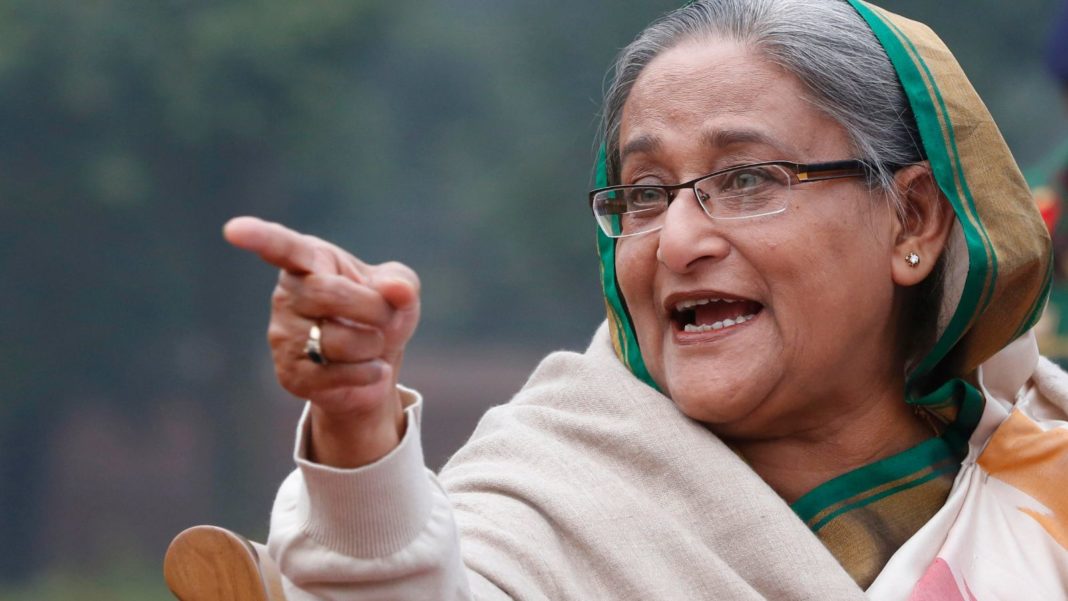On August 5, Sheikh Hasina fled Bangladesh after resigning as the Prime Minister following months of violence and protests against her government’s move to bring in a quota, ending 15 years of continuous rule.
Shortly after local media showed the embattled leader boarding a military chopper with her sister, Bangladesh’s military chief General Waker-uz-Zaman announced plans to seek the president’s guidance on forming interim government.
The rise of Hasina
Born in 1947, the 76-year-old was elected for a fourth consecutive term in January when the elections were boycotted by all major Opposition parties. Thousands of opposition members were jailed in the lead-up to the polls.
Sheikh Hasina Wajed of Bangladesh. Express archive photo
Hasina’s current stint as the PM has been since 2008 when the Awami League (AL) swept the elections. Having been at the helm of the country to date, she is the longest-serving leader in the history of Bangladesh. Having won more elections than Margaret Thatcher or Indira Gandhi, she was also the world’s longest-serving female head of government.
The Bangladeshi leader has led the Awami League, founded by her father Sheikh Mujibur Rahman, since 1981. Hasina served as the prime minister from 1996 to 2001, after defeating her archrival Khaleda Zia, who eventually regained power in 2001.
 Bangladesh Prime Minister Sheikh Hasina Wajed being welcomed by PA Sangma Lok Sabha speaker on her arrival at Palam Airport Today. UNI Photo from Express archive
Bangladesh Prime Minister Sheikh Hasina Wajed being welcomed by PA Sangma Lok Sabha speaker on her arrival at Palam Airport Today. UNI Photo from Express archive
Her first term as Prime Minister was marked by economic progress and infrastructure development. She liberalized the economy, attracted foreign investment, and oversaw a rise in living standards. As such, Bangladesh witnessed a boom in garment exports, becoming a global hub for the industry. Hasina’s focus on education and healthcare earned her plaudits, particularly for her flagship program providing free textbooks to schoolchildren.
However, her relationship with the judiciary became strained during this time, leading to accusations of politicisation and erosion of independence. Her crackdown on political dissent, particularly against the Islamist Jamaat-e-Islami party, drew criticism from human rights groups as well.
 Bangladesh Prime Minister Sheikh Hasina Wajed with Prime Minister Atal Behari Vajpayee at a meeting in Hyderabad House in New Delhi. Express archive photo by Virendra Singh
Bangladesh Prime Minister Sheikh Hasina Wajed with Prime Minister Atal Behari Vajpayee at a meeting in Hyderabad House in New Delhi. Express archive photo by Virendra Singh
Her tenure as the PM was cut short when Bangladesh was plunged into military rule in the 2006-2008 period when the country also witnessed violent street protests, like the ones that marred the nation in the recent months
In 2009, Hasina returned to power with a landslide victory and it is then that she consolidated her hold on power, winning two more terms through elections marred by allegations of rigging and intimidation.
When her family was assassinated
In 1975, when Bangladesh’s the then president Sheikh Mujibur Rahman was killed in a coup, Sheikh Hasina also lost most of her family members besides her father —mother and three brothers. Hasina and her sister Sheikh Rehana were abroad during the time of the assassinations.
 Sheikh Hasina Wajid, Prime Minister of Bangladesh. Express archive photo
Sheikh Hasina Wajid, Prime Minister of Bangladesh. Express archive photo
After her father’s murder, Hasina and her sister Sheikh Rehana had taken refuge in the home of Bangladesh’s ambassador to West Germany before eventually being granted political asylum in India. Hasina was only permitted to return to Bangladesh in 1981.
However, she, too, has survived an attempt on her life in 2004 when a grenade attack at her political rally left multiple dead.
 Sheikh Hasina Wajid, Prime Minister of Bangladesh. Express archive photo
Sheikh Hasina Wajid, Prime Minister of Bangladesh. Express archive photo
Despite being at the helm of power for so long, Hasina’s opponents have constantly accused her of growing increasingly autocratic and called her a threat to the country’s democracy. According to analysts quoted by news agency AP, many say that the current unrest, too, is a result of her authoritarian streak and hunger for control at all costs.


